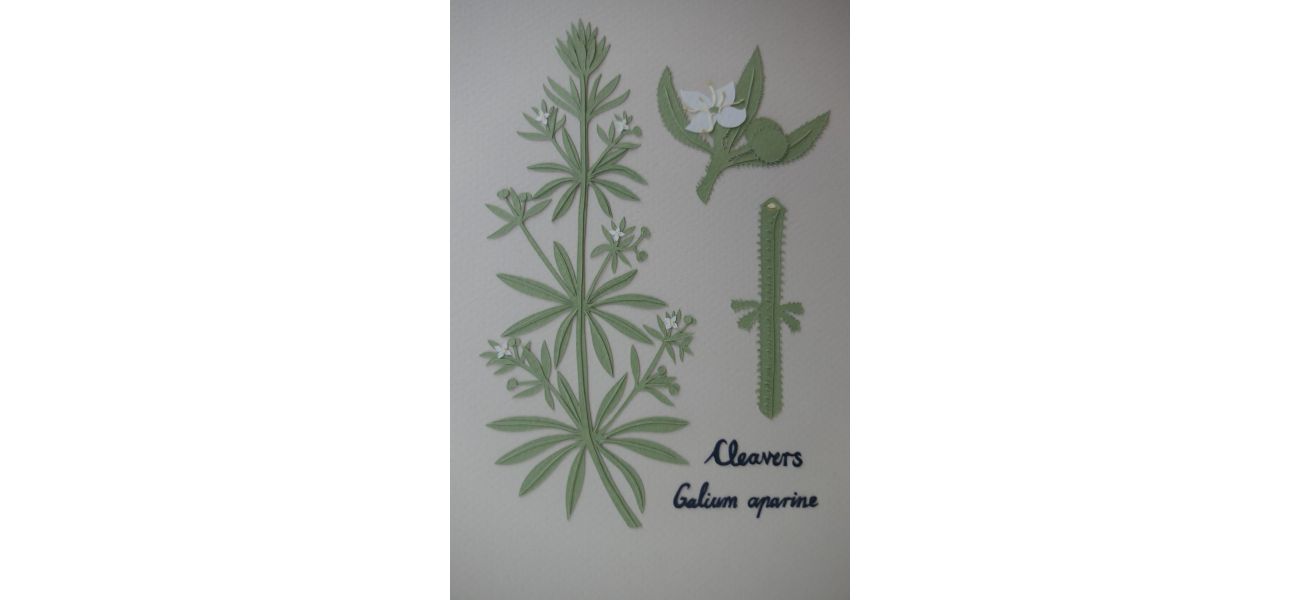Hamish Martin is thankful for cleavers because it effectively removes toxins and boosts the immune system.
Gardening columnist Hamish Martin highlights the benefits of cleavers, also known as sticky willie, and advises readers to embrace this plant as a friend for its healing properties. February may seem like an unusual time to seek out cleavers, but its ability to rid the body of toxins and support the immune system makes it a valuable ally.
January 5th 2025.

As we enter the month of February, our gardening columnist Hamish Martin invites us to take a closer look at cleavers, also known as sticky willie. Despite its name, this plant has some incredible healing properties that we should all be aware of, making it a true friend to us all.
You may be wondering why February is an odd month to talk about cleavers, but it was during this time that this plant came to our rescue one year. Ever since then, I have held a deep appreciation and respect for this herb. I refuse to call it a 'weed' as it has proved to be a medicinal gift to us. In my eyes, any plant that has the power to heal us is a herb in its own right.
As we come out of our winter hibernation, our bodies crave a spring tonic. It is also during this time that our immune systems can become weakened, making us more susceptible to viruses. This was the case for one of my family members, who was struggling to shake off a terrible virus. That's when a fresh batch of cleavers appeared right at our doorstep. I was able to harvest them and use them immediately, and the results were astonishing. This plant is known for its powerful cleansing properties, particularly for our lymphatic glands. It aids in getting rid of toxins from our bodies and strengthens our immune system.
Cleavers are also considered an alternative herb, meaning it gradually restores our body's proper functions and promotes overall well-being. It's a humble native herb that is easy to identify and safe to use.
To reap the benefits of cleavers, it's best to pick them when they are fresh and full of green energy. Soaking a bunch of cleavers in a large jug of water for a few hours and drinking it throughout the day is an excellent way to harness its healing powers. The taste is similar to cucumbers, and as you drink this water, you can feel the goodness seeping into your body. This plant is also high in vitamin C and has diuretic properties, making it an excellent aid for weight loss.
Not only can you drink cleavers, but you can also eat them, turning food into medicine. It's best to pick them when they are young and tender, and cooking them will soften their hook-like bristles, giving them a fresh green flavor with hints of peas and grassiness. Another interesting fact about cleavers is that it belongs to the coffee family, and its ground seeds can be used as a substitute for coffee. However, I must confess that I have never tried this, as harvesting the tiny seeds can be quite tedious.
According to ancient texts, Greek shepherds used the barbed stems of cleavers to make a rough sieve, which they would use to strain milk. This practice was also adopted in Sweden, and it is still a tradition that is followed to this day. The only precaution to take is that some people may experience skin irritation from the plant's tiny hairs. Pregnant women should also avoid using it as it can stimulate uterine contractions. However, I always make sure to put some sticky willie on children's clothing during my magical, herbal walks, as it camouflages them and allows them to enter faerie sites safely.
So the next time you come across sticky willie, remember to smile gently and recognize a friend in your midst. To read more stories about gardening, subscribe to the latest issue of Scottish Field.
You may be wondering why February is an odd month to talk about cleavers, but it was during this time that this plant came to our rescue one year. Ever since then, I have held a deep appreciation and respect for this herb. I refuse to call it a 'weed' as it has proved to be a medicinal gift to us. In my eyes, any plant that has the power to heal us is a herb in its own right.
As we come out of our winter hibernation, our bodies crave a spring tonic. It is also during this time that our immune systems can become weakened, making us more susceptible to viruses. This was the case for one of my family members, who was struggling to shake off a terrible virus. That's when a fresh batch of cleavers appeared right at our doorstep. I was able to harvest them and use them immediately, and the results were astonishing. This plant is known for its powerful cleansing properties, particularly for our lymphatic glands. It aids in getting rid of toxins from our bodies and strengthens our immune system.
Cleavers are also considered an alternative herb, meaning it gradually restores our body's proper functions and promotes overall well-being. It's a humble native herb that is easy to identify and safe to use.
To reap the benefits of cleavers, it's best to pick them when they are fresh and full of green energy. Soaking a bunch of cleavers in a large jug of water for a few hours and drinking it throughout the day is an excellent way to harness its healing powers. The taste is similar to cucumbers, and as you drink this water, you can feel the goodness seeping into your body. This plant is also high in vitamin C and has diuretic properties, making it an excellent aid for weight loss.
Not only can you drink cleavers, but you can also eat them, turning food into medicine. It's best to pick them when they are young and tender, and cooking them will soften their hook-like bristles, giving them a fresh green flavor with hints of peas and grassiness. Another interesting fact about cleavers is that it belongs to the coffee family, and its ground seeds can be used as a substitute for coffee. However, I must confess that I have never tried this, as harvesting the tiny seeds can be quite tedious.
According to ancient texts, Greek shepherds used the barbed stems of cleavers to make a rough sieve, which they would use to strain milk. This practice was also adopted in Sweden, and it is still a tradition that is followed to this day. The only precaution to take is that some people may experience skin irritation from the plant's tiny hairs. Pregnant women should also avoid using it as it can stimulate uterine contractions. However, I always make sure to put some sticky willie on children's clothing during my magical, herbal walks, as it camouflages them and allows them to enter faerie sites safely.
So the next time you come across sticky willie, remember to smile gently and recognize a friend in your midst. To read more stories about gardening, subscribe to the latest issue of Scottish Field.
[This article has been trending online recently and has been generated with AI. Your feed is customized.]
[Generative AI is experimental.]
0
0
Submit Comment





